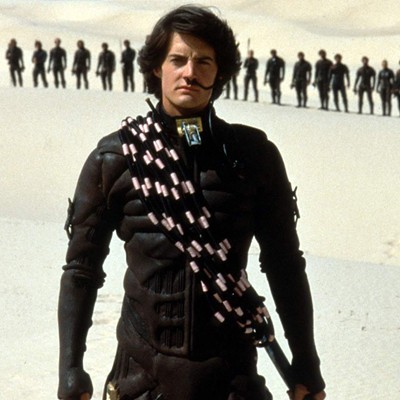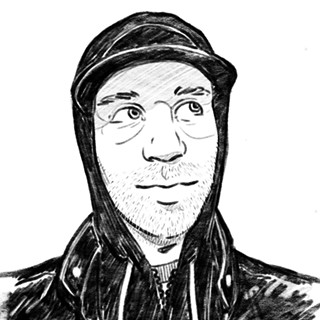
Despite the attempts by many to paint with the broadest of brushes, Jewish culture is not a monolith. And one of the purest expressions of that locally is the annual Spokane Jewish Film Festival.
This year's fest, which runs Jan. 27-Feb. 5, features 17 films including four in-person screenings. It's also a big milestone for SJFF, with 2024 marking its 20th anniversary. To celebrate, things kick off with the festival's first-ever opening night gala, a presentation of the crowd-pleasing Remembering Gene Wilder at the Montvale Event Center (which also includes a silent auction and catering by Feast World Kitchen).
"I've been working on the festival almost a decade now. And when I started, it was still very much a smaller, kind of by-and-for the Jewish community, mostly word-of-mouth kind of thing," says the festival's director, Neal Schindler. "And it has grown substantially in terms of us bringing in members of the general Spokane community, not just the Jewish community. And that's what I've wanted."
With that in mind, the SJFF is bringing back some favorites from the past 20 years of programming that might've been originally seen by smaller audiences, such as the father/son road trip film Magic Men. That film — like many screened over the years — attempts to contend with the legacy of the Holocaust without actually being a film about suffering during the Holocaust.
"In general, I think the festival committee tries not to program too much Holocaust-related stuff, because it's easy to fall into half the festival or more about the Holocaust. And we don't want anyone who attends the festival to think that's the main thing, or the only thing that being Jewish is about today," says Schindler, who points to another film on the slate as an example.
"The film Where Is Anne Frank? is an animated film. We're always excited to present a film that is animated and a film that does have appeal beyond just the adult audience. And this film really looks at kind of what Anne Frank's legacy is. In and around the place where she lived, there is a degree of commodification of her and her narrative. And this film tries to kind of, like, look at how can we still find meaning in something that is [exasperated sigh] for a lot of people, a cliché," Schindler continues. "We don't think that much anymore about who she was or what it all means, but just like she represents a person who was lost in the Holocaust, which represents everyone and it all becomes kind of hard to wrap your head around. But this is kind of back down to 'What meaning can we make of it?'"
There's also lighter fare like Less Than Kosher, in which a 30-year-old Jewish woman who has abandoned religion and is failing at being a rock star takes a gig as a substitute cantor to pay the bills only to find some musical reawakening through the holy music. It's definitely leaning into the awkward vibes of Emma Seligman and Rachel Sennott's stellar 2021 comedy Shiva Baby, but with music video-esque sequences sprinkled into the mix.
This year's SJFF also has to deal with the backdrop of the ongoing devastating warfare in Gaza, where Israel's mass killings of Palestinian civilians has led to a genocide case in the International Court of Justice. Against this backdrop, it's fair to recoil at the prospect of films in SJFF's lineup that touch on the decadeslong Israel-Palestine conflict. Schindler was mindful of this when programming the festival, including rejecting a documentary about the Oct. 7 attack on the Supernova Music Festival in Israel by the Palestinian militant group Hamas that sparked the current bloodshed.
"I kept thinking... too soon. Like, what kind of historical perspective do we have on any of this?" says Schindler. "We just were not going to entertain the possibility. I think that in years to come, there will be Jewish films, Palestinian films, films from other places that have something to say about what's going on right now. But now is not the moment that we have those films."
With that in mind, the films that do focus on the tensions in that region are older ones as part of the 20th anniversary retrospective like A Borrowed Identity.
"That film actually foregrounds a Palestinian perspective," says Schindler. "The main character is Palestinian and ends up at a boarding school in Jerusalem. I really liked it when we first showed it. And that is not something you see at every Jewish Film Festival. I think increasingly, you do see films that include in a substantial way a Palestinian point of view. What I also like about that film is that the director is an Israeli Jew, and the screenwriter is Palestinian. And it is a fascinating collaboration."
For the full festival schedule and more info, visit
spokanejewishfilm.org. ♦
EXPERIENCE PALESTINE: A FILM FESTIVAL
This week also sees the start of Experience Palestine: A Film Festival. Starting Jan. 28, the Inland Northwest Coalition for the Liberation of Palestine is hosting screenings of Palestinian documentaries at Unitarian Universalist Church every Sunday for a month. Things start with 1948, which chronicles memories of the 1948 expulsion of about half of the Palestinian people from their homes following the Partition Plan for Palestine. That's followed by 5 Broken Cameras (Oscar-nominated doc about a farmer filming Israel destroying Palestinian farmland), Al Helm: MLK in Palestine (American singers joining a Palestinian National Theatre production about Martin Luther King Jr.), and Imprisoning A Generation (centered on four young Palestinians imprisoned by Israel). For more information visit the INW Coalition for the Liberation of Palestine's Facebook page.




















